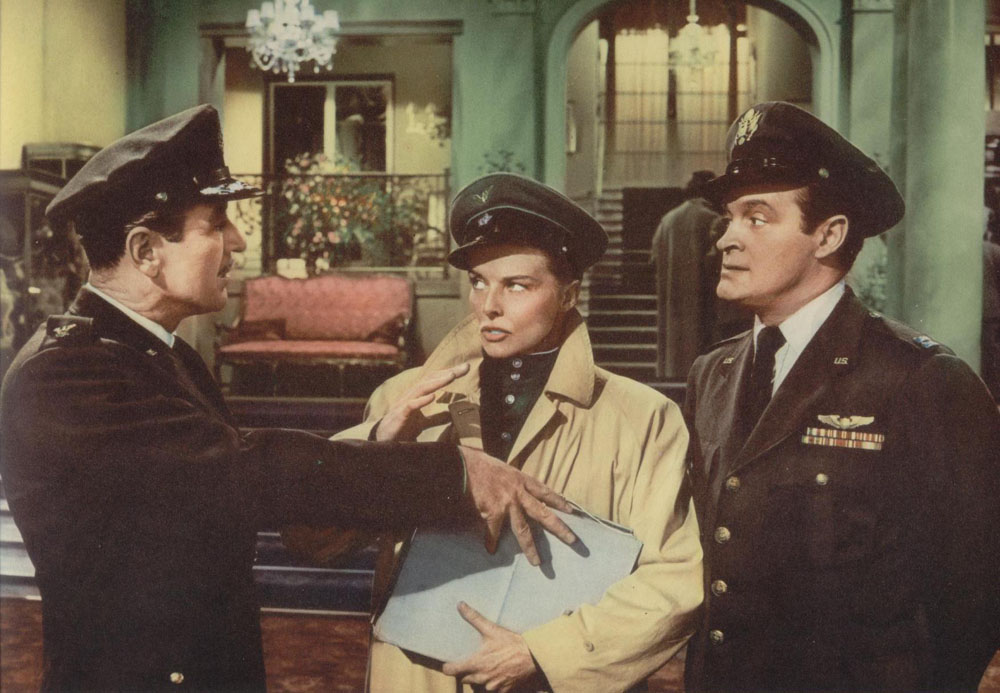The only screen teaming of screen legends Bob Hope and Katharine Hepburn is finally making its US TV debut on Turner Classic Movies on Thursday, 46 years after “The Iron Petticoat’’ opened in theaters.
Unavailable in the country for decades because of a long-ago public feud between Hope and the film’s screenwriter, TCM finally managed to clear the tangled TV and video rights to this Cold War romantic comedy — with a little help from yours truly.
Oscar winner Ben Hecht’s script about an Air Force captain assigned to “thaw out’’ a female Soviet flying ace who defects in Europe was originally written for Hepburn and her frequent co-star Cary Grant. When Grant passed, the film’s British producers signed up Hope. He also became a co-producer with Hecht and Harry Saltzman (later of the James Bond films) and they initially shared Western Hemisphere rights to the movie.
Hope brought in his own writers to rework Hecht’s script — transforming it into what Hepburn described in her memoir “his cheap vaudeville act with me as his stooge.’’ Hepburn and Hope had nothing but nice things to say about each other at the time, and they have more on-screen chemistry than you’d imagine. But the film’s box-office chances were doomed when Hecht took out a full-page ad in the Hollywood Reporter before the film’s release in December 1956 to Hope and their film.
“My dear partner Bob Hope,’’ Hecht began. “This is to notify you that I have removed my name as author from our mutilated venture, ‘The Iron Petticoat.’ Unfortunately, your other partner, Katharine Hepburn, can’t shy out of the fractured picture with me. Although her magnificent comic performance has been blowtorched out of the film, there is enough of the Hepburn footage to identify her for the sharpshooters . . .”
Hecht’s target shot back with his own ad signed “Bob (Blow Torch) Hope” — “The way things are going you simply can’t afford to be associated with a hit. I don’t think [Hepburn] was depressed with the preview audience raving about her performance.”
Savaged by critics, “The Iron Petticoat’’ flopped and the embarrassed Hope refused to let the US distributor, MGM, exercise an option for TV showings. He bought out his partners and after writing MGM a personal check for $38,500 to settle the movie’s losses in 1970, took sole possession. Aside from a single showing at the Museum of Modern Art in 1976, Hope steadfastly refused to allow the film to be exhibited anywhere in the Western Hemisphere.
When Hope died at age 100 in July 2003 — a month after Hepburn — I wrote an article for The Post about “The Iron Petticoat,’’ which I had seen on a DVD from England (where, thanks to different ownership, it’s long been available). After it ran, I was surprised to get a call from Hope’s longtime publicist Ward Grant — asking me where Hope Enterprises could buy a copy of a film they owned.
I periodically wrote about “The Iron Petticoat,’’ and in 2011, following the death of Hope’s widow Dolores, I was contacted by a lawyer representing Hope Enterprises seeking missing legal files to help establish ownership. I knew TCM’s parent company, Turner Entertainment, held those papers along with MGM’s pre-1968 film library. It also turns out TCM’s programmers had been trying to license “The Iron Petticoat’’ for decades — but just didn’t have the right contact at Hope Enterprises that I was able to provide.
So that’s the bizarre saga of how TCM got to show the long-lost movie — and also put it out on DVD in the US. It was mastered from a gorgeous transfer from the original British Technicolor negative — ironically, complete with the Ben Hecht screenplay credit excised from American prints.

